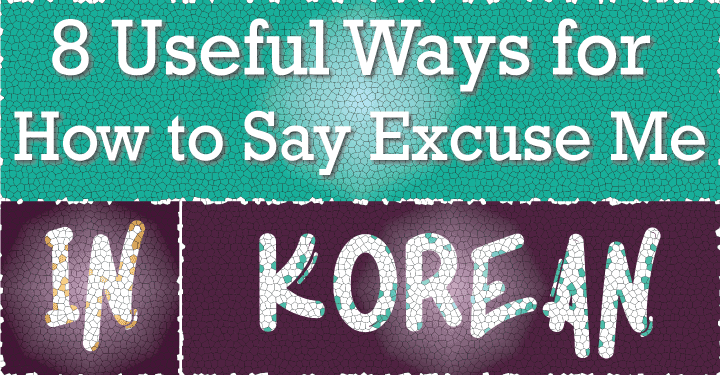8 Useful Ways for How to Say Excuse Me in Korean
Maybe you are trying to get the server’s attention at a restaurant but you end up walking over to the server to get help. Maybe a person is standing behind you in the convenience store saying something when you feel a nudge against your back just in time to realize that they were trying to say, “Excuse me.”
Well, this lesson will teach you 8 useful ways for how to say “Excuse me” in Korean.
실례합니다 Excuse Me in Korean
실례합니다 is “Excuse me” in Korean and the dictionary form of the word is 실례하다. 실례합니다 is formal so don’t be afraid to use it when you need to.
Usages:
1. To get someone’s attention
2. When you need to pass by somebody that is in your way
잠깐만요 & 잠시만요 Excuse Me in Korean
These phrases are very common and you can here them nearly everyday. While these phrases literally mean “Just a moment” they are used to say “Excuse me” quite frequently too. I often hear 잠시만요 when I am at a restaurant and the server wants me to get out of the way so that she may set something on the table.
잠깐 = a moment
잠시 = a moment
만 = only, just
잠깐만요 = Just a moment (Polite)
잠시만요 = Just a moment (Polite)
The syllable 요 on the end of a sentence makes the sentence polite. You may take the 요 off of 잠깐만요 or 잠시만요 to make them informal.
잠깐만 = Just a moment (Informal)
잠시만 = Just a moment (Informal)
Usages:
1. To get someone’s attention
2. When you need to pass by somebody that is in your way
저기요 & 여기요 Excuse Me in Korean
저기요 and 여기요 are used to get someone’s attention. You will hear this all of the time in restaurants by patrons trying to grab the attention of a server.
여기요! 물 좀 주세요. = Excuse me! Give me some water please.
Names & Titles for Excuse Me in Korean
When speaking to people you know you should use their name or title instead of saying 저기요 or 여기요.
Names:
This method is usually reserved for people younger than you and friends.
혜란아! = Hey Hyeran!
유나야! = Hey Yoona!
Titles:
This is easy. You can just call people in your family by the word that describes their relationship to you.
하라버지! = Grandpa!
삼촌! = Uncle!
The Korean language treats everybody as if they are one big family so family titles are also used with people that aren’t really your family. Confusing, right?
Imagine that you are in school and there is another girl there that is two years older than you. To get here attention say:
언니! = Older sister!
This word can only be used by a female to an older female. There are more words like this. Check them out.
| Korean | English | Relationship |
| 언니 | Older Sister | female to female |
| 오빠 | Older Brother | female to male |
| 누나 | Older Sister | male to female |
| 형 | Older Brother | male to male |
| 행 (Busan dialect) | Older Brother | male to male |
Here are a few more title words that you may use in a similar way:
| Korean | English | Relationship |
| 아저씨 | Middle aged man | to older male |
| 아줌마 | Middle aged woman | to older female |
| 이모 | Aunt | to older female |
| 사장님 | Boss | to store owner |
Remember to take caution when you use these titles because people don’t like to be called “Old” in general. Someone might think you are calling them old if you use a title that doesn’t match their real age but don’t worry, we have all done it.
죄송합니다 Excuse Me in Korean
죄송합니다 is “Sorry” in Korean but it is often used to say “Excuse me” too. You can also use this to ask someone to move out of your way when you want to pass by.
죄송합니다 = Excuse me. (I want to pass by.)
[mailmunch-form id=”290776″]

